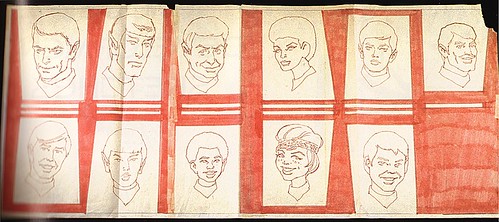I do remember reading a lot of fanzines from the time that just treated TAS as being TOS reborn. Many of those episode guides included the 22 animated episodes as being part of the fabric. I believe people still believed that up until the late 1980s too, it was Gene Roddenberry who really threw a hand grenade at TAS about the time TNG started up. But Gene was decanonizing a lot of things at that time. Wasn't it around then he actually employed somebody to be the arbiter of what was and was not official Star Trek? I think when it came to some things they tended to throw baby out with the bathwater. No disrespect to Gene's opinion (it was his baby), but I think from any kind of objective perspective it's actually much easier to accept TAS than to reject it.
Totally agree Christopher. They could have gone the same route that so many of those other cartoons based on live action TV did and include funny sidekicks etc. That was standard practice at a time. TAS might even have been one of the earliest examples of a TV cartoon which actually remained true to the source it was adapting. It's pretty much the done thing these days, but was surprisingly uncommon back then. Everything in cartoon land used to get kiddified, whereas TAS nearly always treated its audience with respect: they toned down some of the more adult aspects, but remained true to both the spirit and the word of TOS for the most part.
I also used to love the little continuity nods. Fanwank I know, but things like the allusion to "All Our Yesterdays" in "The Counter-Clock Incident" and so on. The intergration between TOS and TAS is pretty seamless most of the time.
It was made by people who were big fans of the original show. And of course it was story-edited by D.C. Fontana, and about half its episodes were written by veterans of the original series (well, 10 if you limit it only to TOS writers, 12 if you include the ones written by Walter Koenig and TOS director Marc Daniels). It's as authentic a continuation as we could possibly have gotten in animation. The other studios that made proposals for an animated ST all wanted to add kid sidekicks and cute alien mascots and just generally turn it into a stock kids' cartoon. But the show we got, other than toning down the sex and violence, strove to tell the same kind of stories that TOS had told, albeit with unlimited freedom to create exotic aliens and settings.
Totally agree Christopher. They could have gone the same route that so many of those other cartoons based on live action TV did and include funny sidekicks etc. That was standard practice at a time. TAS might even have been one of the earliest examples of a TV cartoon which actually remained true to the source it was adapting. It's pretty much the done thing these days, but was surprisingly uncommon back then. Everything in cartoon land used to get kiddified, whereas TAS nearly always treated its audience with respect: they toned down some of the more adult aspects, but remained true to both the spirit and the word of TOS for the most part.
I also used to love the little continuity nods. Fanwank I know, but things like the allusion to "All Our Yesterdays" in "The Counter-Clock Incident" and so on. The intergration between TOS and TAS is pretty seamless most of the time.




